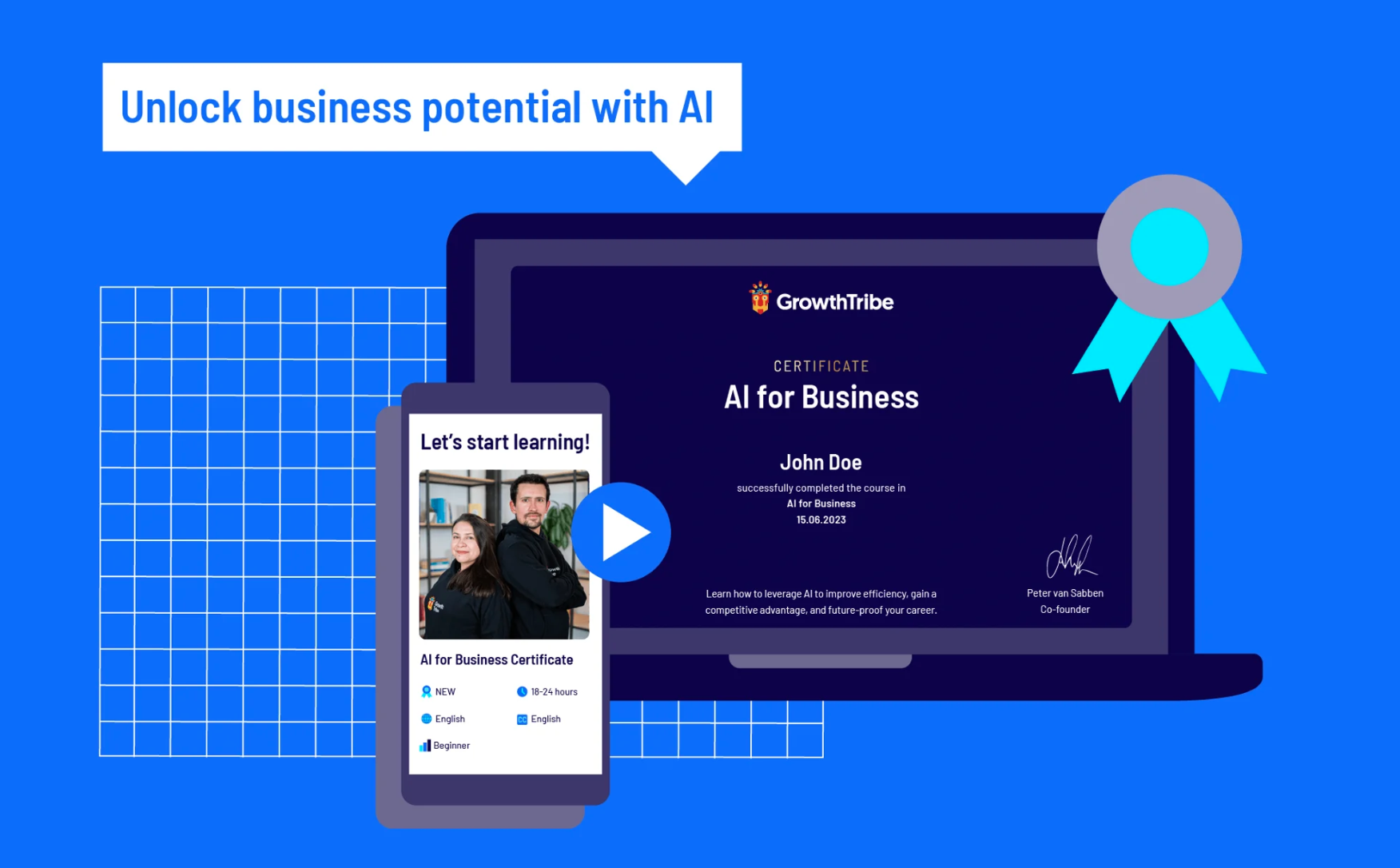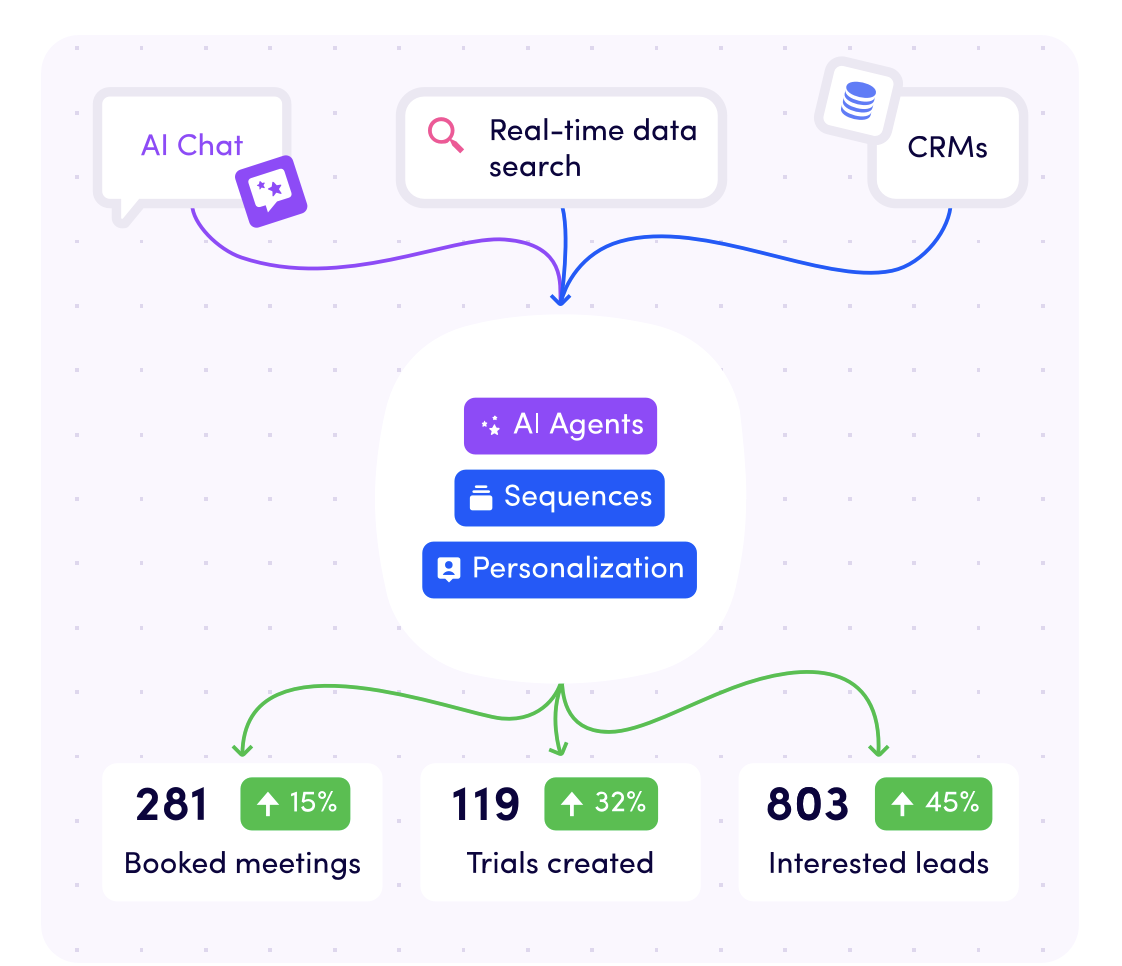Artificial intelligence (AI) has emerged as a game-changer for organisations worldwide in today's rapidly evolving digital landscape. From streamlining operations to revolutionising customer interactions, AI holds the potential to reshape how businesses operate and thrive in the 21st century.
Whether you're a seasoned entrepreneur or a curious newcomer, join us as we answer some frequent inquiries on AI for business.
Take a quick look at each question:
1. What is AI for business?
2. Why is AI for business important?
3. Who can take an AI for business course?
4. What will I learn in the course?
5. What is the format of the course?
6. What are the prerequisites for taking the course?
7. Is it possible to use AI to start a business?
8. What do business leaders need to know about AI?
9. How do I know if AI is appropriate for my business?
10. How does AI impact different industries within business?
11. How can AI enhance decision-making processes in business?
12. Want to learn more about AI for business?

(Image source: Growth Tribe)
1. What is AI for business?
AI for business involves using artificial intelligence technologies to enhance various aspects of business functions, operations, decision-making, and customer interactions.
It includes applications like predictive analytics, chatbots, machine learning, and computer vision to automate repetitive tasks, gain actionable insights from data, and deliver personalised experiences to improve customer satisfaction. Essentially, AI empowers businesses to innovate, improve efficiency, and stay competitive in the digital age.
2. Why is AI for business important?
AI for business is vital because it enhances efficiency by automating manual tasks, enables data-driven decision-making, fosters personalised customer service experiences, provides a competitive edge through innovation, and saves costs by streamlining operations.
Overall, AI empowers businesses to stay agile, competitive, and relevant in today's dynamic market.
3. Who can take an AI for business course?
Whether you're a seasoned business leader, a content creator seeking to enhance your marketing strategies, an entrepreneur aspiring to disrupt industries, or a professional eager to integrate AI into your business practices, the AI for Business Certificate course is meticulously crafted to equip you with the knowledge and skills you need to excel in today's AI-driven landscape.
if you want a list of the best AI for business courses in 2024, check out this blog.
4. What will I learn in the course?
You can learn about:
- Master AI fundamentals: Gain a solid understanding of AI and machine learning concepts, including different types of ML and AI, their applications, and approaches to AI projects.
- Develop an AI business strategy: Learn how to define the problem statement, evaluate whether AI is the right solution, build a data strategy, establish an organisational infrastructure, and navigate ethical and legal considerations.
- Harness the power of GenAI for text: Explore the capabilities of large language models (LLMs) like ChatGPT, delve into prompt engineering techniques, and discover how to leverage LLMs at scale.
- Utilise GenAI for design: Understand the role of generative AI (GenAI) in creating visuals, explore the wide range of applications in communication, marketing, and product development, and learn how to effectively use text prompts and visual communication.
- Boost productivity with AI: Adopt an automation mindset, discover AI tools for personal and team productivity, and learn how to implement AI solutions to optimise processes and enhance organisational productivity.
- Make data-driven decisions with AI-powered predictions: Understand the concept of predictions, learn the process of AI predictions, explore how to link predictions with decisions, and discover various prediction use cases and considerations.
5. What is the format of the course?
The course is delivered online in a self-paced format.
You will have access to a variety of deep learning and natural language processing materials, including video lessons, quizzes, and case studies. You will also have the opportunity to interact with other students and instructors in our online community.
6. What are the prerequisites for taking the course?
The course typically does not require any prior experience with AI, making it accessible to beginners.
However, having a basic understanding of computers and the Internet is recommended as it can facilitate smoother navigation through course materials and concepts.
7. Is it possible to use AI to start a business?
Absolutely! Starting a business in today's AI-driven world involves taking opportunities amidst technological advancements.
Begin by finding an idea rooted in personal experiences and emerging trends. Ensure scalability to accommodate growth without infrastructure constraints. Build a strong brand and protect it with patents and trademarks. Craft concise business objectives and utilise AI to refine them for potential investors. Finally, leverage AI in marketing efforts to optimise strategies and accelerate growth. By following these steps, entrepreneurs can navigate the evolving landscape of business with confidence.
8. What do business leaders need to know about AI?
Business leaders must be well-informed about the potential risks associated with AI adoption.
While AI tools offer tremendous benefits, they also pose certain risks, particularly regarding data security and privacy. Generative AI tools often access sensitive business information, raising the risk of data breaches and confidentiality breaches. To mitigate these risks, leaders must implement robust strategies for data vetting, bias detection, and cybersecurity measures in their adoption of generative AI technologies. By proactively addressing these concerns, business leaders can harness the power of AI while minimising potential risks to their organisation.
9. How do I know if AI is appropriate for my business?
Determining whether AI is suitable for your business requires careful consideration and implementation.
A crucial step involves assembling a cross-functional team comprising members from IT, operations, and relevant business units to ensure a comprehensive understanding of AI's potential impact. It's essential to define clear objectives and metrics, establish specific, measurable goals for AI adoption and monitor progress through key performance indicators (KPIs). Starting with pilot projects in controlled environments allows for testing, assessing impact, and making necessary adjustments with minimal risk before full-scale deployment. Additionally, focusing on data quality is paramount, given AI's reliance on accurate and reliable data. Investing in data cleaning processes to rectify errors and inconsistencies ensures the integrity of your datasets, ultimately facilitating a smoother AI integration process tailored to your business ideas, needs, and objectives.
10. How does AI impact different industries within business?
AI profoundly impacts various industries by enhancing efficiency, reducing costs, improving accuracy, and providing personalised customer experiences.
It also offers valuable insights from data that human intelligence may struggle to identify independently. For example, in healthcare, AI streamlines patient care processes, while in finance, it optimises risk management. In transportation, it powers autonomous vehicles, and in retail, it drives personalised marketing efforts. Overall, AI revolutionises operations and drives innovation across different business sectors.
11. How can AI enhance decision-making processes in business?
AI revolutionises decision-making processes in business by leveraging its capacity to analyse vast datasets in real time.
This empowers businesses to engage in predictive analytics across various domains, from sales forecasting to inventory management. By accurately predicting future trends, AI facilitates proactive decision-making and minimises risks. Furthermore, AI's ability to analyse historical data provides valuable insights into past performance, enabling businesses to make informed decisions about future strategies. Through data-driven recommendations, AI ensures that business decisions are comprehensive and based on a thorough understanding of the business landscape. This underscores the transformative potential of AI in facilitating smarter, data-driven decision-making business processes, ultimately leading to enhanced competitiveness and success in the ever-evolving business environment.
Want to learn more about AI for business?
You’re in the right place! AI is a fascinating field and one that is building tremendous traction across the business landscape.
As technology advances, artificial intelligence applications for business are becoming more plausible in everyday practice.
AI is being used to save time and increase productivity outputs over many different roles and sectors.
This course will help you and your team boost productivity with AI solutions and make data-driven decisions for the future.
6 Modules | 24 lessons | 24 videos | 6 tests | 6 exercises
- Module 1: AI and Machine Learning Fundamentals
- Module 2: AI business strategy
- Module 3: GenAI for text: ChatGPT and prompt engineering
- Module 4: GenAI for design: text prompts and visual communication
- Module 5: AI for productivity
- Module 6: AI-powered predictive insights
👉 Check out our course here












